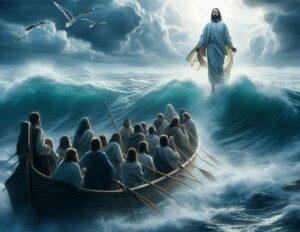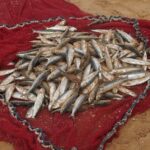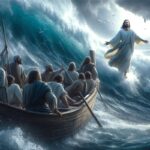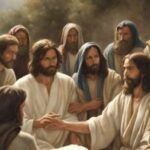John Chapter 6:1-71 King James Bible KJV

The Feeding of the Five Thousand, Jesus Walks on Water, The Bread of Life Discourse, Responses to Jesus’ Teachings
John Chapter 6:1-71 King James Bible KJV. John Chapter 6 is a profound chapter in the Gospel of John that focuses on themes of Jesus as the Bread of Life, the need for faith, and the nature of true discipleship. It reveals the challenges of true discipleship, the necessity of believing in Jesus’ sacrificial death, and the promise of eternal life for those who trust in Him.
It begins with the miraculous feeding of the five thousand and culminates in Jesus’ teaching on being the Bread of Life, which emphasizes that true life is found in Him. This chapter includes major events such as the feeding of the five thousand, Jesus walking on water, and His Bread of Life discourse, which causes division among His followers.
The Overall Meaning of John Chapter 6:
- Jesus as the Bread of Life: The central message of this chapter is that Jesus is the true bread from heaven, the only one who can satisfy the deepest needs of the human soul. Physical food sustains life temporarily, but Jesus provides spiritual nourishment that leads to eternal life. This teaching emphasizes the need to rely fully on Jesus for spiritual sustenance and salvation.
- Faith in Jesus for Eternal Life: Throughout the chapter, Jesus invites people to come to Him in faith. Those who believe in Him will receive eternal life. Faith is more than intellectual agreement—it is a deep, abiding trust in Jesus’ identity and His sacrificial death.
- Jesus’ Sacrificial Death: Jesus’ reference to eating His flesh and drinking His blood points to His upcoming death on the cross. This sacrificial act is the means by which people can receive eternal life. Believers must participate in this sacrifice through faith, symbolized in some interpretations by the practice of the Eucharist.
- Challenges to Faith: Jesus’ teachings are difficult and offensive to some, causing many to turn away. This reflects the challenge of true discipleship, which demands a commitment to follow Jesus even when His teachings are hard to understand or accept.
- The Need for Spiritual Understanding: Many of the people in this chapter focus on physical needs and misunderstand Jesus’ spiritual message. Jesus repeatedly calls people to look beyond material concerns and understand the deeper, spiritual realities He offers.
John Chapter 6:1-71 King James Bible KJV
—————-
The Feeding of the Five Thousand – verses 1-15
Jesus crosses the Sea of Galilee, and a large crowd follows Him because of the miracles He has performed. Seeing the crowd, Jesus has compassion on them and asks His disciples how they will feed so many people. Andrew finds a boy with five barley loaves and two fish. Jesus gives thanks, multiplies the food, and miraculously feeds all five thousand people, with twelve baskets of leftovers remaining.

KEY THEMES:
Messianic Expectations: After the miracle, the crowd tries to make Jesus king by force, reflecting their hope that He is the political and military messiah they were expecting. Jesus withdraws, rejecting this misunderstanding of His mission.
Miraculous Provision: This miracle shows Jesus’ divine power to meet physical needs in a miraculous way. The abundance of leftovers symbolizes God’s overwhelming provision.
Symbol of Spiritual Nourishment: While the crowd is initially focused on physical food, this miracle serves as a precursor to Jesus’ teaching about Himself as the true spiritual nourishment—the Bread of Life.


Jesus Walks on Water – verses 16-21
That evening, the disciples get into a boat to cross the Sea of Galilee, but a strong wind makes rowing difficult. In the middle of the night, they see Jesus walking on the water toward them, and they are terrified. Jesus reassures them, saying, “It is I; do not be afraid.” When He gets into the boat, they immediately reach the shore.
KEY THEMES:
Jesus’ Divine Power: Walking on water displays Jesus’ authority over nature, emphasizing His divine identity. This miraculous act reassures the disciples of His presence and power.
“It Is I”: Jesus’ words, “It is I” (Greek: “Ego eimi”), echo the divine name of God revealed in the Old Testament (“I AM”). This reinforces the idea that Jesus is divine.
Faith and Fear: This event shows that faith in Jesus’ presence overcomes fear and danger, reflecting the broader theme of trusting in Jesus during life’s storms.

The Bread of Life Discourse – verses 22-59
The crowd follows Jesus to the other side of the sea and asks Him how He got there. Jesus challenges their motives, telling them that they are seeking Him only because of the physical bread He provided, not for the deeper spiritual nourishment He offers. He calls them to seek the “food that endures to eternal life,” which He gives. His teachings are:
- The True Bread from Heaven (John 6:32-33): Jesus contrasts the manna that God gave to the Israelites in the wilderness (Exodus 16) with the true bread from heaven that gives eternal life. He says, “The bread of God is He who comes down from heaven and gives life to the world.”
- “I Am the Bread of Life” (John 6:35): Jesus declares, “I am the bread of life. Whoever comes to Me shall never hunger, and whoever believes in Me shall never thirst.” This is one of Jesus’ “I AM” statements, revealing His divine identity and the necessity of faith in Him for spiritual life.
- Eternal Life through Jesus: Jesus explains that He is the only source of eternal life. Just as bread sustains physical life, Jesus sustains spiritual life. Those who come to Him in faith will never experience spiritual hunger or thirst.
- Eating the Flesh and Drinking the Blood (John 6:53-58): Jesus uses a striking metaphor to explain that His followers must “eat His flesh and drink His blood” to have eternal life. While this language is shocking, it symbolically refers to participating in His sacrificial death (on the cross) and receiving His life through faith.
- Spiritual Interpretation: Eating and drinking His flesh and blood is understood spiritually, meaning that believers must fully accept Jesus’ sacrifice and rely on Him for life. Some interpret this passage as pointing toward the Eucharist (Communion), where bread and wine symbolize Christ’s body and blood.
KEY THEMES:
Jesus as the Source of Life: Jesus is the spiritual sustenance for humanity, the “bread” that brings eternal life. Physical bread satisfies temporary hunger, but only Jesus can satisfy the deeper, eternal needs of the soul.
Faith in Jesus’ Sacrifice: Jesus’ teaching about His flesh and blood refers to His upcoming death, where He will give Himself as a sacrifice for the sins of the world. Believing in and receiving His sacrifice is essential for salvation.
Rejection by Many: This teaching causes confusion and offense among many of Jesus’ followers, especially because of its graphic language and the demand for radical faith in Him. Many disciples turn away at this point.

Responses to Jesus’ Teaching – verses 60-71
Many of Jesus’ disciples struggle to accept His teaching about being the Bread of Life and “eating His flesh and drinking His blood.” They say, “This is a hard teaching. Who can accept it?” As a result, many of them stop following Jesus.

Peter confesses when Jesus asks the Twelve if they also want to leave, and Peter responds with a powerful declaration of faith: “Lord, to whom shall we go? You have the words of eternal life. We have come to believe and to know that You are the Holy One of God.”
KEY THEMES:
Faith and Commitment: Jesus’ teachings are challenging and require a deep commitment of faith. Many followers abandon Him because they cannot accept these hard truths, showing that true discipleship requires more than just curiosity or excitement about miracles.
Peter’s Declaration of Faith: Despite the difficult teachings, Peter recognizes that Jesus is the only source of eternal life. This response models the faith and understanding that Jesus seeks in His disciples.
John Chapter 6:1-71 King James Bible KJV
1 After these things Jesus went over the sea of Galilee, which is the sea of Tiberias.
2 And a great multitude followed him, because they saw his miracles which he did on them that were diseased.
3 And Jesus went up into a mountain, and there he sat with his disciples.
4 And the passover, a feast of the Jews, was nigh.
5 When Jesus then lifted up his eyes, and saw a great company come unto him, he saith unto Philip, Whence shall we buy bread, that these may eat?
6 And this he said to prove him: for he himself knew what he would do.
7 Philip answered him, Two hundred pennyworth of bread is not sufficient for them, that every one of them may take a little.
8 One of his disciples, Andrew, Simon Peter’s brother, saith unto him,
9 There is a lad here, which hath five barley loaves, and two small fishes: but what are they among so many?
10 And Jesus said, Make the men sit down. Now there was much grass in the place. So the men sat down, in number about five thousand.
11 And Jesus took the loaves; and when he had given thanks, he distributed to the disciples, and the disciples to them that were set down; and likewise of the fishes as much as they would.
12 When they were filled, he said unto his disciples, Gather up the fragments that remain, that nothing be lost.
13 Therefore they gathered them together, and filled twelve baskets with the fragments of the five barley loaves, which remained over and above unto them that had eaten.
14 Then those men, when they had seen the miracle that Jesus did, said, This is of a truth that prophet that should come into the world.
15 When Jesus therefore perceived that they would come and take him by force, to make him a king, he departed again into a mountain himself alone.

16 And when even was now come, his disciples went down unto the sea,
17 And entered into a ship, and went over the sea toward Capernaum. And it was now dark, and Jesus was not come to them.
18 And the sea arose by reason of a great wind that blew.
19 So when they had rowed about five and twenty or thirty furlongs, they see Jesus walking on the sea, and drawing nigh unto the ship: and they were afraid.
20 But he saith unto them, It is I; be not afraid.
21 Then they willingly received him into the ship: and immediately the ship was at the land whither they went.

22 The day following, when the people which stood on the other side of the sea saw that there was none other boat there, save that one whereinto his disciples were entered, and that Jesus went not with his disciples into the boat, but that his disciples were gone away alone;
23 (Howbeit there came other boats from Tiberias nigh unto the place where they did eat bread, after that the Lord had given thanks:)
24 When the people therefore saw that Jesus was not there, neither his disciples, they also took shipping, and came to Capernaum, seeking for Jesus.
25 And when they had found him on the other side of the sea, they said unto him, Rabbi, when camest thou hither?
26 Jesus answered them and said, Verily, verily, I say unto you, Ye seek me, not because ye saw the miracles, but because ye did eat of the loaves, and were filled.
27 Labour not for the meat which perisheth, but for that meat which endureth unto everlasting life, which the Son of man shall give unto you: for him hath God the Father sealed.
28 Then said they unto him, What shall we do, that we might work the works of God?
29 Jesus answered and said unto them, This is the work of God, that ye believe on him whom he hath sent.
30 They said therefore unto him, What sign shewest thou then, that we may see, and believe thee? what dost thou work?
31 Our fathers did eat manna in the desert; as it is written, He gave them bread from heaven to eat.
32 Then Jesus said unto them, Verily, verily, I say unto you, Moses gave you not that bread from heaven; but my Father giveth you the true bread from heaven.
33 For the bread of God is he which cometh down from heaven, and giveth life unto the world.
34 Then said they unto him, Lord, evermore give us this bread.
35 And Jesus said unto them, I am the bread of life: he that cometh to me shall never hunger; and he that believeth on me shall never thirst.
36 But I said unto you, That ye also have seen me, and believe not.
37 All that the Father giveth me shall come to me; and him that cometh to me I will in no wise cast out.
38 For I came down from heaven, not to do mine own will, but the will of him that sent me.
39 And this is the Father’s will which hath sent me, that of all which he hath given me I should lose nothing, but should raise it up again at the last day.
40 And this is the will of him that sent me, that every one which seeth the Son, and believeth on him, may have everlasting life: and I will raise him up at the last day.
41 The Jews then murmured at him, because he said, I am the bread which came down from heaven.
42 And they said, Is not this Jesus, the son of Joseph, whose father and mother we know? how is it then that he saith, I came down from heaven?
43 Jesus therefore answered and said unto them, Murmur not among yourselves.
44 No man can come to me, except the Father which hath sent me draw him: and I will raise him up at the last day.
45 It is written in the prophets, And they shall be all taught of God. Every man therefore that hath heard, and hath learned of the Father, cometh unto me.
46 Not that any man hath seen the Father, save he which is of God, he hath seen the Father.
47 Verily, verily, I say unto you, He that believeth on me hath everlasting life.
48 I am that bread of life.
49 Your fathers did eat manna in the wilderness, and are dead.
50 This is the bread which cometh down from heaven, that a man may eat thereof, and not die.
51 I am the living bread which came down from heaven: if any man eat of this bread, he shall live for ever: and the bread that I will give is my flesh, which I will give for the life of the world.
52 The Jews therefore strove among themselves, saying, How can this man give us his flesh to eat?
53 Then Jesus said unto them, Verily, verily, I say unto you, Except ye eat the flesh of the Son of man, and drink his blood, ye have no life in you.
54 Whoso eateth my flesh, and drinketh my blood, hath eternal life; and I will raise him up at the last day.
55 For my flesh is meat indeed, and my blood is drink indeed.
56 He that eateth my flesh, and drinketh my blood, dwelleth in me, and I in him.
57 As the living Father hath sent me, and I live by the Father: so he that eateth me, even he shall live by me.
58 This is that bread which came down from heaven: not as your fathers did eat manna, and are dead: he that eateth of this bread shall live for ever.
59 These things said he in the synagogue, as he taught in Capernaum.

60 Many therefore of his disciples, when they had heard this, said, This is an hard saying; who can hear it?
61 When Jesus knew in himself that his disciples murmured at it, he said unto them, Doth this offend you?
62 What and if ye shall see the Son of man ascend up where he was before?
63 It is the spirit that quickeneth; the flesh profiteth nothing: the words that I speak unto you, they are spirit, and they are life.
64 But there are some of you that believe not. For Jesus knew from the beginning who they were that believed not, and who should betray him.
65 And he said, Therefore said I unto you, that no man can come unto me, except it were given unto him of my Father.
66 From that time many of his disciples went back, and walked no more with him.
67 Then said Jesus unto the twelve, Will ye also go away?
68 Then Simon Peter answered him, Lord, to whom shall we go? thou hast the words of eternal life.
69 And we believe and are sure that thou art that Christ, the Son of the living God.
70 Jesus answered them, Have not I chosen you twelve, and one of you is a devil?
71 He spake of Judas Iscariot the son of Simon: for he it was that should betray him, being one of the twelve.
You must be logged in to post a comment.